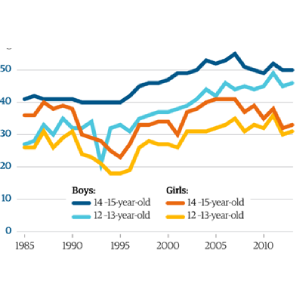Psychologists have developed an instrument to measure a person’s disposition towards gratitude. It’s called Gratitude Questionnaire 6. See the instrument questions below.

Reverse the scores for 3 and 6 and then sum. A typical score is 33-37.
A person’s gratitude score is highly dependent on whether they are predisposed to being grateful. The factors that influence that predisposition are complicated. Some example factors are below.
| Personality Traits | Individuals high in traits like agreeableness, humility, and emotional stability are more likely to experience gratitude. |
| Optimism | Optimistic individuals tend to notice and appreciate the positive aspects of life, fostering gratitude. |
| Empathy | People with a strong capacity for empathy are better able to recognize and value others’ kindness, leading to gratitude. |
| Self-esteem | A healthy sense of self-worth allows individuals to receive and acknowledge kindness without feeling undeserving. |
| Quality of Relationships | Supportive and positive relationships encourage the exchange of kind acts, which can elicit gratitude. |
| Acts of Kindness | Experiencing or witnessing generosity from others often sparks gratitude. |
If you are a parent, gratitude joins the list of attributes of your kid that are shaped by factors that are not in your control. You could influence the quality of their relationships, and, to a degree,
you can show them acts of kindness and help them develop self-esteem. But the other factors are outside of your control .
I think our daughters have a challenge with helping their kids maintain healthy self-esteem in an age where their kids have so much exposure to the Internet. There is a belief that is difficult to prove that material on the Internet damages a kid’s self-esteem. Our grandkids see kids like themselves only those kids are smarter, more athletic, better looking, have more friends, etc. Alot of the material they see is nonsense, but they don’t know that.
The amount of time that a kid spends on the Internet each day is breathtaking. That is coupled with the fact that it is harder to control and filter the information a kid receives than it was when I was a kid.
When I was a kid, information about world events, good versus bad behaviors and values came from parents, network TV (the content of which was highly regulated by the FCC), the local newspaper, publications such as Life magazine, teachers and figures such as coaches, priests and scout leaders. These sources were more homogenous in their messages and parents could more easily control them by, for example, restricting which shows you watch. Today the Internet exposes kids to thousands of sources of information.

The graph on the left shows that an estimated 97% of US teenagers use the web multiple times a day. The graph on the right shows the percentage of UK young people scoring in the highest bracket of self-esteem scores. Girls consistently have lower scores than boys .
Self-esteem peaks when you are in your early 50s and then declines with age, dropping below levels of self-esteem you had when you were in your early 20s. Why? Major factors are declining health, diminished financial status, loss of job identity when you retired and realizing that your life was not as full and rewarding as perhaps you hoped when you were young.
[1] This allows you to tell a kid, “It’s not my fault that you are ungrateful and unhappy. You were born that way.”
[1] As a manager, I believed that men thought that they were better than they were, and women never believed that they are as good as they were.

While a person’s self-esteem level can change over the course of their life healthy self-esteem is very important. Self-esteem turns out to be a particularly good predictor of success in life, e.g., a good marriage, and professional success. Helping your kid develop healthy self-esteem may be one of the most important things you do for them.
I remember having dinner, decades ago, with Fred and Nicki Drake (my in-laws) and our daughters who were in their early teens. Fred remarked that they were remarkably poised for people so young. I agree; it was very cool to see the foundation of self-worth.
If you want to check out your level of self-esteem, you can use the widely adopted Rosenberg Self-Esteem Scale below.

